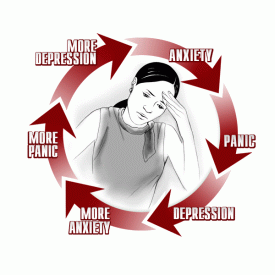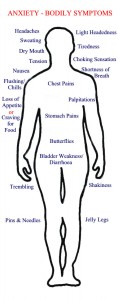What is normal anxiety?

Anxiety can be described as a feeling of alarm or “worry”. It may be about something specific or it may be non-specific in nature. A certain amount of anxiety is normal and helps improve our performance and allows people to avoid dangerous situations. This normally lasts for a short period causing no impairment in social or occupational functioning. When this anxiety is prolonged and affects social or occupational functioning, it’s abnormal and accounts for anxiety “disorder”.
What do you mean Anxiety disorders ?
Patients often experience a state of intense apprehension, uncertainty, and fear resulting from the anticipation of a threatening event or situation, often to a degree that normal physical and psychological functioning is disrupted. This may be precipitated due to several reasons which are generally easily identified by the patient himself. The anxiety is of a greater degree than just everyday worries and patients do mention that they are not able to control these worries. They are frequently accompanied with physical symptoms as well. These symptoms have to present for most days at least for several weeks at a time.
Anxiety disorders also manifest as physical symptoms along with psychological symptoms. Some of the common things that patients experience are as follows:
- Feeling that something undesirable or harmful is about to happen (edginess and apprehension)
- Dry mouth; swallowing difficulty; hoarseness
- Rapid breathing and heartbeat, palpitations
- Twitching or trembling
- Muscle tension; headaches; backache
- Sweating
- Difficulty in concentrating
- Dizziness or faintness
- Nausea; diarrhea; weight loss
- Sleeplessness
- Irritability
- Fatigue
- Nightmares
- Memory problems
- Sexual impotence
Causes
There are more than one reason why patients develop Anxiety disorders. Researchers and scientists are trying to find out more about the biological, psychological, and social factors which influence the development of anxiety disorders as there is still a lot more to learn about the role of these. The following are all believed to play a role in the occurrence of anxiety disorders:
- Genetics and heredity
- Chemical imbalances in the brain
- Personality types
- Social factors
- Medical conditions
- Drugs and other substances
Types
The Diagnostic and Statistical Manual of Mental Disorders (DSM –IV) classifies anxiety disorders into the following categories:
- Panic disorder with or without Agoraphobia
- Acute stress disorder
- Post-traumatic stress disorder
- Social phobia
- Specific phobias
- Obsessive Compulsive Disorder
- Generalized anxiety disorders
- Anxiety due to medical causes
- Substance induced anxiety disorders
Homeopathic Approach :
Homeopathy offers an excellent treatment for all stages of Anxiety Disorders, especially. Homeopathy can take care of various symptoms of Anxiety Disorders.
Homeopathy can positively influence personality traits that are working at the base of disease. The important aspect is that depression is a disease in which genetic make-up is topped with environmental stress result in disease. Homeopathic medicines are very deep acting and having potential to counter genetic tendencies, addressing the root cause of the disease and hence prevent the relapse and recurrence of the condition.
To know More about Management of Anxiety disorder
@ Sattvam log on to :





